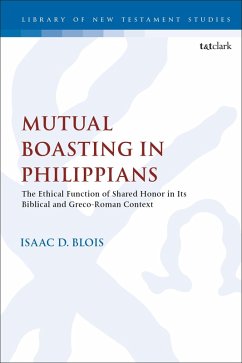Isaac Blois argues that Paul's focus in Philippians on the mutual boasting shared between himself and his converts draws on the mutual boasting shared between Israel and her covenant God, as apparent in both Deuteronomy and Isaiah. Using the appearance of this central theme in the pivotal passages of Phil 1:25-26 and 2:14-16 as his focus, Blois stresses the integral relation between mutual boasting and the role that it plays in Paul's exhortations to the Philippian believers, exploring its backdrop in both the biblical tradition and the cultures surrounding them.
Blois demonstrates how the mutual boasting that Paul shares with his beloved community is culturally appropriate; the sharing of honor among friends and family was common in antiquity, as seen through the epistolary writing of prominent Roman authors such as Cicero, Seneca, and Fronto. In light of the Scriptural and cultural basis for this motif of shared boasting, Blois argues that the apostle is able to deploy the motif in order to motivate an appropriate response from his audience in the letter. Focusing on the prominence of mutual honor and its use for motivation in Philippians 1 and 2, Blois offers a fresh perspective on the exhortative function of the eschatological boasting that is to exist between Paul and his congregation on the day of Christ.
Blois demonstrates how the mutual boasting that Paul shares with his beloved community is culturally appropriate; the sharing of honor among friends and family was common in antiquity, as seen through the epistolary writing of prominent Roman authors such as Cicero, Seneca, and Fronto. In light of the Scriptural and cultural basis for this motif of shared boasting, Blois argues that the apostle is able to deploy the motif in order to motivate an appropriate response from his audience in the letter. Focusing on the prominence of mutual honor and its use for motivation in Philippians 1 and 2, Blois offers a fresh perspective on the exhortative function of the eschatological boasting that is to exist between Paul and his congregation on the day of Christ.


